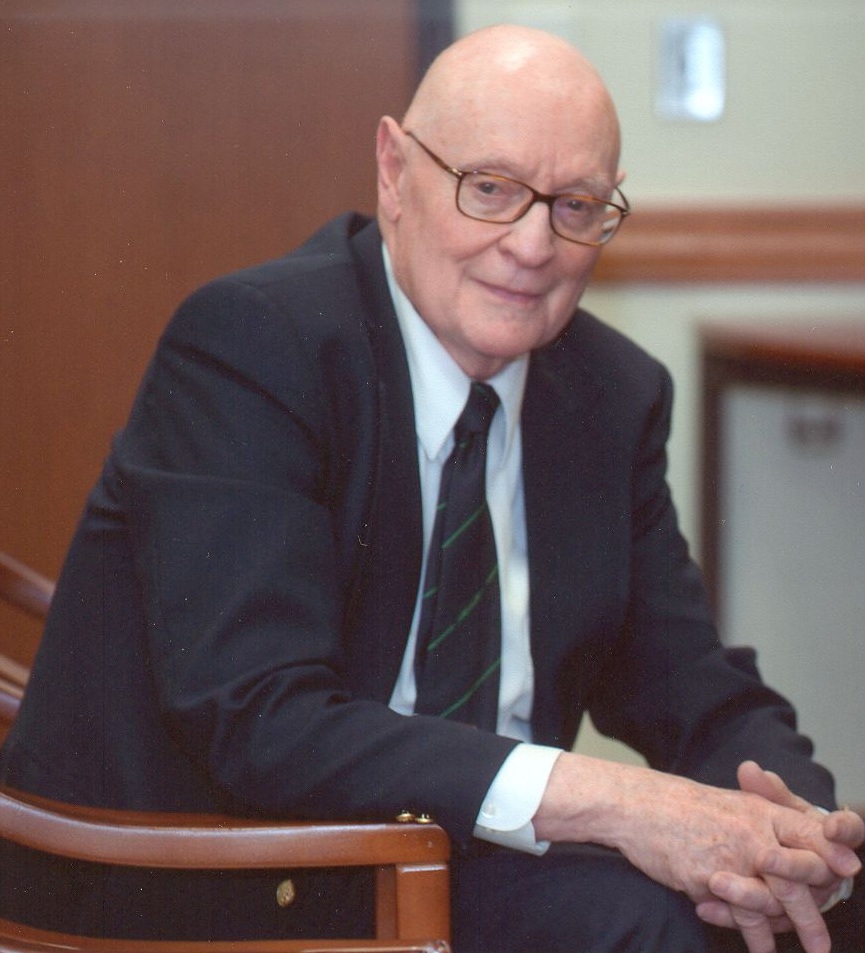death
Nicholas Rescher (1928-2024)
Nicholas Rescher, professor of philosophy at the University of Pittsburgh, well-known for his work on logic, metaphysics, and epistemology, has died.

Professor Rescher wrote extensively on a wide variety of topics, including logic, epistemology, philosophy of science, metaphysics, political philosophy, and ethics. He is the author of over 100 books and 400 articles, including: Kant and the Reach of Reason (1999), Nature and Understanding: A Study of the Metaphysics of Science (2000), Epistemology: On the Scope and Limits of Knowledge (2003), Free Will (2009), Axiogenesis: An Essay in Metaphysical Optimalism (2010), The Pragmatic Vision: Themes in Philosophical Pragmatism (2014), amongst numerous others. He is well-known for introducing and developing several principles of logic, including the Rescher quantifier, as well as the theory of axiogenesis. You can learn more about Professor Rescher’s work here and here.
Professor Rescher was on the faculty at the University of Pittsburgh since 1961. Prior to that, he held positions at Princeton University, the RAND Corporation, and Lehigh University. He earned his PhD in philosophy from Princeton University in 1951 at the age of 22 and his undergraduate degree from Queens College (CUNY) in 1949. Professor Rescher also held eight honorary degrees.
In addition to Professor Rescher’s prolific contribution to philosophical literature, he was also the founder of three academic journals—American Philosophical Quarterly, History of Philosophy Quarterly, and Public Affairs Quarterly—and served as President for several academic organizations, including the American Philosophical Association, the American Catholic Philosophy Association, the American G.W. Leibniz Society, the C.S. Pierce Society, and the American Metaphysics Society. Professor Rescher also received several notable prizes and awards, including the Humbolt Prize and the Aquinas Medal. The University of Pittsburgh established The Nicholas Rescher Prize in his honor, which was later changed to The Nicholas Rescher Medal when the American Philosophical Association introduced The Rescher Prize.
UPDATE: An obituary from the University of Pittsburgh
The post Nicholas Rescher (1928-2024) first appeared on Daily Nous.
Antonio Negri (1933-2023)
Antonio Negri, a well-known Italian political philosopher and Spinoza scholar, has died.

Negri’s writings include a trilogy of books in political philosophy co-authored with Michael Hardt (Duke), the first of which was Empire, books on Spinoza such as Subversive Spinoza: (un)contemporary variations and The Savage Anomaly: The Power of Spinoza’s Metaphysics and Politics, and many other works. You can learn more about his writings here.
Negri earned his PhD and had his first academic appointment at the University of Padua. His life was hardly that of the typical academic. In the late 1970s, he was accused of leading the Red Brigades, an Italian Marxist military group, orchestrating a political murder, and plotting to overthrow the government. These charges were dropped but, according to Wikipedia, he was convicted of being “the instigator” of the murder of a political activist and having “morally concurred” with the murder of a police officer during an attempted bank robbery. After a few years in prison he ran for a seat in the Italian legislature and won, getting himself freed from prison on the basis of parliamentary immunity. He then fled to Paris, where he taught at Paris VIII (Vincennes) and the Collège international de philosophie (which had been co-founded by Jacques Derrida). He returned to Italy in 1997 to serve out the rest of his prison sentence, which had been reduced, and was released in 2003.
He died in Paris on December 16th, 2023.
The post Antonio Negri (1933-2023) first appeared on Daily Nous.
André Kukla (1942-2023)
André Kukla, Professor Emeritus of Philosophy and Psychology at University of Toronto, has died.
(The following obituary was provided by Quill Kukla.)

André Kukla, Professor Emeritus of Philosophy and Psychology at University of Toronto, died peacefully in Toronto on December 14, 2023. Perhaps best-known to philosophers through his 2000 book, Social Constructivism and the Philosophy of Science, Kukla published widely in philosophy of science and philosophy of psychology, and also wrote science fiction and a successful trade book, Mental Traps: The Overthinker’s Guide to a Happier Life. An unendingly imaginative philosopher, he published books on extraterrestrial communication and on mystical ineffability, among other topics.
Born in Belgium in January, 1942, Kukla survived the Holocaust as a young Jewish child hidden in the basement of a foster family. After moving several times post-war, he ended up in Los Angeles, where he found community in high school with the children of blacklisted Jewish communists. At 16, after only a few years of formal schooling, in his fourth language, he won the Westinghouse Science Prize in the same year as Saul Kripke, and went to Cal Tech on a full scholarship to study physics. Annoyed by the single-sex environment at Cal Tech, he transferred to UCLA, where he received degrees in physics, mathematics, philosophy, and psychology. At UCLA, he worked closely with Richard Montague, Alonzo Church, Rudolph Carnap, David Kaplan, and David Lewis, as well as renowned social psychologist Bernard Weiner, and he remained interested throughout his career in applying the clarity, minimalism, and rigor of the logical positivists to unconventional topics. While writing his dissertation he moved for a while to Berkeley, where he befriended Allen Ginsburg, Timothy Leary, and Abbie Hoffman, and developed a lifelong interest in and passion for psychedelic drugs and consciousness alteration.
A vigorous and vocal opponent of the Vietnam War and all forms of US foreign intervention, Kukla chose a faculty position at University of Toronto over Yale in 1970 in order to leave the United States, after spitting when Nixon tried to shake his hand at his wedding reception. Although he remained a professor at University of Toronto for his entire career, he lived a peripatetic, adventurous life, taking extended leaves to live with his family in a tiny mountain village and a Tibetan monastery in Hawai’i, a medieval ghost town in France, a crumbling colonial hotel in Morocco, and various other places across the globe.
Those who knew André Kukla will remember him most for his devastatingly dry and creative sense of humor; his manifest brilliance (which included speaking four languages fluently and another five competently); his anti-authoritarianism; and his complete, disdainful lack of interest in any social conventions or traditions that he did not see as grounded in rational argument.
Kukla died at Castleview-Wychwood Towers Long Term Care Home, his home since 2017, after living for 25 years with Parkinson’s disease. He is survived by his adoring wife of 56 years, Kaila Kukla; his two children, Rabbi Elliot Kukla and philosopher Quill Kukla; his brother, Dan Kukla; and his two grandchildren, Eli Kukla-Manning and Moss Leo Kukla.
The post André Kukla (1942-2023) first appeared on Daily Nous.
Mark Sagoff (1941-2023)
Influential environmental philosopher Mark Sagoff, retired Professor of Philosophy and Distinguished Senior Fellow at the Institute for Philosophy and Public Policy at George Mason University, has died.

Professor Sagoff was known for his interdisciplinary work across a range of topics in environmental philosophy, including ethics, law, economics, public policy, and science. He is the author of Price, Principle, and the Environment and The Economy of the Earth: Philosophy, Law, and the Environment, among other works. You can learn more about his writings here and here.
Sagoff was one of the early members of the Institute for Philosophy and Public Policy (IPPP), which was founded in 1976 at the University of Maryland to provide expertise on the normative dimensions of public policy, including environmental policy (it subsequently moved to George Mason University). A memorial notice at the Institute discusses the significance of this work:
In the late 1970’s, there were very few, if any, research institutes devoted to applied ethics or what is broadly considered as “public philosophy” today. Consequently, Mark, and fellow Institute members, were trend-setters in developing a new kind of philosophy focused on the normative dimensions of public policies. This work quickly saw uptake and support for their ideas in think tanks, NGOs, philanthropies, and governments. Institute members communicated through traditional academic articles and books, but also policy reports, advisory memos, and innovative publicly-engaged projects, including, under Mark’s guidance, the influential Philosophy and Public Policy Quarterly, which successfully bridged the gap between the academy and institutions of public decision-making.
Sagoff was a member of the faculty at George Mason University from 2011 until his retirement in 2016. Prior to that, he was at the University of Maryland, Princeton University, the University of Pennsylvania, the University of Wisconsin (Madison), and Cornell. He earned his PhD from the University of Rochester and his undergraduate degree from Harvard University.
The Institute’s memorial notice includes remarks from its current director, Andrew Light, about Sagoff. He says:
Mark both was and was not a philosopher of the old school—delighting in the most difficult abstract puzzles and problems—but spending most of his time engaging with disciplines on the front lines of public decision-making. He inspired so many of us by demonstrating that a morally responsible and defensible public policy required a seat at the table for those with philosophical training who were willing to wholly immerse themselves in the details of a policy arena. He constantly challenged us to take those seats and was unfailing in his support.
Mark Sagoff died on Tuesday, December 12th, 2023.
(via Jesse Kirkpatrick)
Obituaries elsewhere:
Washington Post
Boston Globe
The post Mark Sagoff (1941-2023) first appeared on Daily Nous.
Singer-Songwriter Indigo de Souza on Death and the Beauty of Life
The opening track of de Souza’s first album is titled “How I Get Myself Killed.” It’s a straightforward indie-rock cut, with a simple chord progression and cathartic release. “This is probably how I get myself killed,” she repeats in the chorus’s refrain. It’s unclear exactly what she is referring to. The threat to her life mostly feels like a nebulous entity, as if she’s gesturing vaguely at her surroundings....
Mark Rollins (1947-2023)
Mark Rollins, emeritus professor of philosophy at Washington University in St. Louis, has died.

Professor Rollins was known for his work on aesthetics and philosophy of mind. He is the author of Mental Imagery: On the Limits of Cognitive Science, and many articles and chapters, including “What Monet Meant: Intention and Attention in Understanding Art,” “Cognitive Science and Art Criticism,” and “The Invisible Content of Visual Art,” among others. You can learn more about his writing here.
Rollins joined the Department of Philosophy at Washington University in 1987, and taught courses in both Philosophy and in the Philosophy-Neuroscience-Psychology program, which he helped create in the early 1990s. He also served as chair of the Department of Philosophy and He earned his PhD from Columbia University, his MA from California State University, Los Angeles, and his undergraduate degree from the University of Oklahoma.
The Washington University Department of Philosophy has posted a memorial notice here. In it, philosopher Ron Mallon says, “It is no exaggeration to say that Mark Rollins was the most important chair in recent history for the philosophy department, and many of us would not be here but for the foundation that he laid. He had a kind of gift for seeing and exploring possibilities for the department and the university. Mark was also a valuable mentor for those of us who came along later in his career—a ready source of wise advice based on his broad experience.”
He died on November 24th, from cancer.
The post Mark Rollins (1947-2023) first appeared on Daily Nous.
Beer Mats of the 1970s
The pubs have reopened. Here is a selection of 1970s beer mats from the Scarfolk council archives. Collect them all!
NOW AVAILABLE to buy from Saatchi Gallery!
Includes:8 x Different beer mats1 x printed insert1 x presentation box
'Little Lady' Breath Mirror Corpse Detection Set (mid-70s)
Apocalyptic toys were all the rage in the late 1970s, not that they were thought of as apocalyptic at the time. Citizens didn't fear their annihilation; they quite looked forward to demonstrating their 'Dunkirk spirit' with the misguided belief that it would somehow bring the country together. It didn't occur to them that their dogmatic nationalism might instead bring about the demise of the nation.
As the country moved toward collapse, social unrest and inevitable casualties increased. The paranoid state began anonymously exterminating citizens who so much as hinted at insurrection. Average (and the vast numbers of below-average) people were killed in street clashes between opposing factions and there were spates of frightened suicides.
Scar Toys exploited this expanding market opportunity and created a range of toys aimed at the many children in the process of being orphaned. One such toy, the Breath Mirror Set, aimed at young girls, was designed to accompany their more traditional beauty/vanity toys. The deluxe set (see picture above) included one mirror for each parent, colour-coded as per gender convention: pink for girls, blue for boys.
The wording on the back of the packaging encouraged children to use the mirrors beyond the death of their own parents. Included was a little booklet into which little pink stars could be affixed for every corpse that was identified using the mirrors. Highly sought-after prizes were awarded to the girls with the most stars and council archival documents reveal that the police turned a blind eye when gangs of little girls began slaughtering adults in frenzied attempts to accumulate more stars.
The Banned Horror Top Trumps Card (1978)

Many readers will remember the two packs of Horror Top Trumps, which were first issued in 1978. What is not commonly known is that the first pack was recalled after 3 days only to be rereleased a month later minus one card: The Scarfolk card.
The card had proved so effective that, not only could it effortlessly beat every other card, it also killed the losing player within moments of the game ending.
Learning of the inexplicable power of the card, the government immediately issued the recall, albeit not in the interest of public safety. Instead, it coerced citizens on welfare into playing the game during home assessment visits. The government also targeted enemies of the state, using the card in so-called 'black operations' at home and abroad.
In 1979, a catastrophe was narrowly avoided when the Scarfolk card was played in a game opposite a forgery of itself. Fortunately, the game's location was sparsely populated and the only victims of the resulting dark-matter explosion were a government agent, an unknown dissenter, seven ducks and, less significantly, four coachloads of orphans* who were driven to the remote site for reasons unknown.
*The orphans were children of disgraced artists, academics and other intellectuals who disappeared during the New Truth Purges of September 1977**.
** Edit: Apparently, according to fresh information, no such purges took place.
Happy Halloween/Samhain from everyone at Scarfolk Council.









